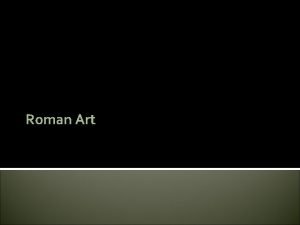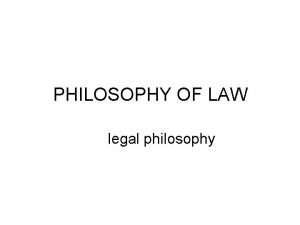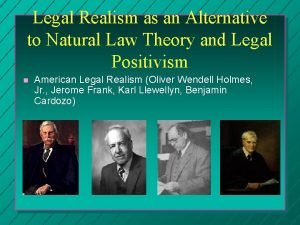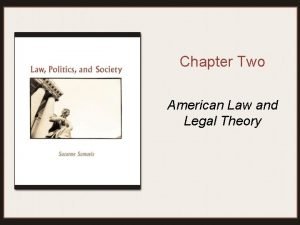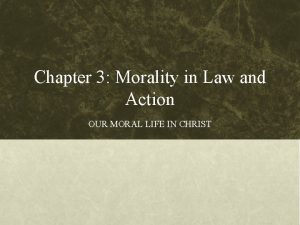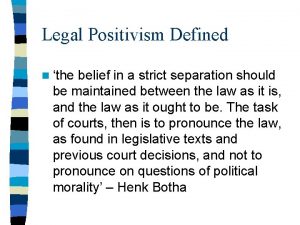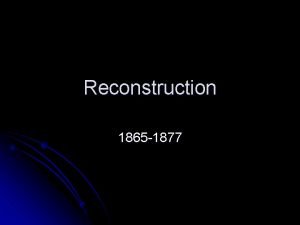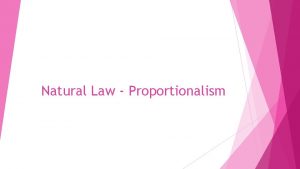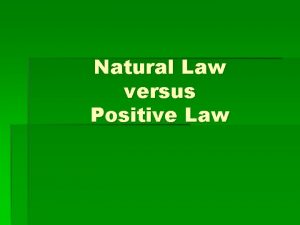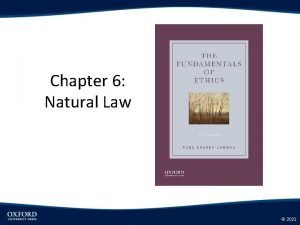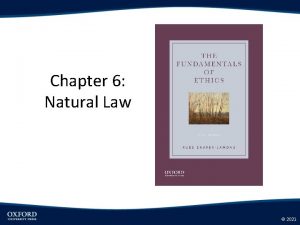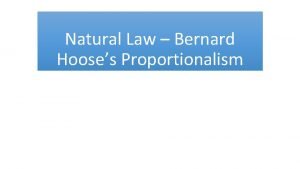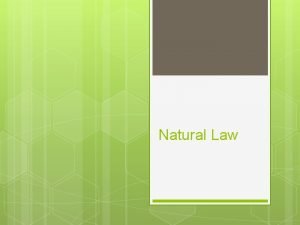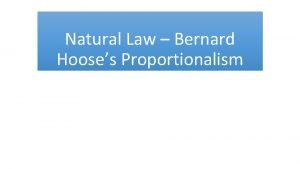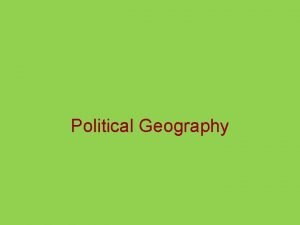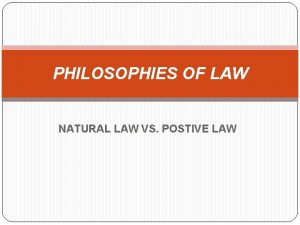Political Theory Natural Law Political theory is less












- Slides: 12

Political Theory: Natural Law Political theory is less a science than a practical way of describing how a society should function in its governing. One must always ask what “ought” to be done but one must also see what IS being done. However, scientific thinking did affect political thinking from the Renaissance onward Machiavelli pointed the way for a more complex rendering of human political thought. His own preference was for republican government to whom citizens were attached through patriotism (literally father feeling)

Political Theory However, in THE PRINCE Machiavelli disregarded the idea of what would be the best form of government, a fairly medieval and scholastic question, in favor of observing how successful rulers and governments actually behaved. By doing so, Machiavelli separated moral and theological arguments from his political philosophy, basing it on how princes (governments) actually did business. They followed self interest or state interest. Machiavelli agreed that this was bad, but said that was not the issue nor the question. The question was, what did effective rulers, good rulers by definition, do? Using history as evidence Machiavelli drew his conclusions. Machiavelli both described good rule and advocated it, tying together both political and moral implications. Governments have always acted in this manner and people have always refused to believe that this is how they ought to behave.

Natural Right and Natural Law By the 17 th century Machiavelli was seen as cynical. Political theory and theorists did not embrace his concepts nor did they accept that one form of government was essentially as good as another. The question became: What is right? How do people determine the correctness of government? The idea of natural law and natural right underlay most of this discussion. These ideas are essential contributors to modern democratic development.

Natural Law and Natural Right Natural Law is easier to define than to categorize There is, somehow, in the structure of things, law that distinguishes right from wrong. Right is natural apart from human invention; it exists independently of human custom, lore, tradition, heritage, and even of existing “positive” laws. (Laws that are enforced. ) All of these may be unjust, unfair, or even wrong. To determine what should be, comparisons with Natural Right and Law as we understand it must be made This allows for judgment to be made

Natural Right and Natural Law The innate “rightness” of something cannot even be determined by the people or any authority. No one can make something inherently wrong, right by fiat or vote. Natural Law and Right ultimately exists outside and above human frameworks. They are universal. No one can make up “new” natural law or right. It is organic to the system of the world. A good king or law, a just people or issue, are those whose actions correspond to an objective standard as defined by Natural Law.

Natural Right and Natural Law Thus begging the question, if we cannot trust our heritage, current laws, or indeed, anything else to show us what these things are, how can it be done? How can we know Natural Law? The answer as derived by 17 th century theorists is this: WE DISCOVER IT BY REASON, AND BY REASON ALONE. Natural Law philosophers said that all humans have, the potentiality, when enlightened, of rationality. They are all therefore able to attain an understanding of Natural Law and Right. For Locke this was all educated people; for Hobbes this was only the few who should rule.

Natural Law and Natural Right In turn this seemed to lead to the idea of human progress and international cooperation as rational, attainable goals. At least from Locke’s perspective The last 100 years have seen a degradation of emphasis of this belief as humans are seen today as not innately rational but driven by instincts or urges, and cultural differences that render Natural Law a mere phantasm of the 17 th and 18 th centuries. Regardless, at the time these ideas were generally accepted, and political theories were derived to support this. As is to be expected, several differing versions of what Natural Law and Right support or are were derived from the same origins.

From where do we get our understanding of political theory? For Americans, Locke is the most important figure in deriving political theory. Americans have not, for the most part, indulged in creating new theory about politics. Jefferson used Locke extensively when writing the Declaration of Independence, in some cases in the document practically quoting Locke’s ideas about the social contract which seemed to him to spring from Natural Law and Right incorporate life, liberty, and property as the foundations of Natural Law. Echoes of this can be seen in Hume as well as in Adam Smith’s seminal book on economics “The Wealth of Nations” Locke believed that reason will force people to create a social contract with the government to ensure that Natural Law (ie. Life, liberty, and property) is sustained with the consent of the governed. We give up little freedom to have government. But note, we do it freely and with limitations.

From where…? Locke’s experience as a political renegade during the latter years of Charles II reign in England informed and underscored his ideas. In fact, if one looks closely, one can see the parallels between developments in England during the late 17 th century and his theorizing. The Glorious Revolution of 1688 -89, the work of Whigs opposed to arbitrary monarchy, is partially the outcome of Locke’s writings. For the Whigs, Locke’s evocation of Natural Law essentially states why and how government should be. It is the logical outcome of reason applied to statecraft. No Machiavellian tendencies are to be found here. Application of Locke’s theories have proved that it is far easier to theorize about government than to implement theory. Experience has shown that governments are essentially like Machiavelli proposed regardless of rhetoric.

And now for the other view drawn from the same well of Natural Law and Right Hobbes, looking at the same concepts, drew an entirely different understanding from Natural Law. Having survived the Civil War (1642 -1649), the Commonwealth (1653 -1660) and the Restoration in England, Hobbes was appalled by the violence and anarchy he saw around him. Using Natural Law and the Social Contract as the basis for his theory, Hobbes concluded that only an absolute ruler could control the unreasoning mob of the governed. As Locke believed reason would prevail, Hobbes believed chaos would.

Hobbes In Leviathan, Hobbes sets out his views. Because people must join together to create societies and because they are not usually rational agents, a different sort of social contract is called for. Hobbes believed that people must give all their rights to a ruler, who by the nature of the contract, would tell them what to do. In Hobbes famous words, man’s life is by nature short, nasty, and brutal. This informed his view of the political world. Hobbes monarch was not imbued by god with his authority. Rather, the people gave the absolute ruler his power. This was a natural derivation from Natural Law. Thus, his ideas differed from that of monarchs in Europe who claimed divine right absolutism. Therefore, English Tories did not use Hobbes political theories since they denied the presence and action of god in human affairs.

And the winner is…? Both Locke and Hobbes derived their very different theories of government from the same source: Natural Law. Both felt that what they had seen corroborated what they theorized. Both went through the same English upheavals to draw their conclusions. While Americans are thoroughly Lockeian in their political theorizing, Hobbesian attributes are also found in HOW government takes place. Constant battle is joined between our ideals of government and our practice of government. Both Locke and Hobbes appear to be correct if Natural Law is valid. Most political theorists today consider the concept to be outdated or at the most explicable for a special set of circumstances.
 Less religious and less idealized than greek art
Less religious and less idealized than greek art Programl
Programl Natural law vs positive law
Natural law vs positive law Natural law vs positive law
Natural law vs positive law Positive law vs natural law
Positive law vs natural law Natural law vs positive law
Natural law vs positive law Natural law vs positive law
Natural law vs positive law Legal positivism
Legal positivism Why is this political cartoon called “one less vote?”
Why is this political cartoon called “one less vote?” Newton's first law and second law and third law
Newton's first law and second law and third law Si unit of newton's first law
Si unit of newton's first law Boyles law
Boyles law How to calculate boyle's law
How to calculate boyle's law
